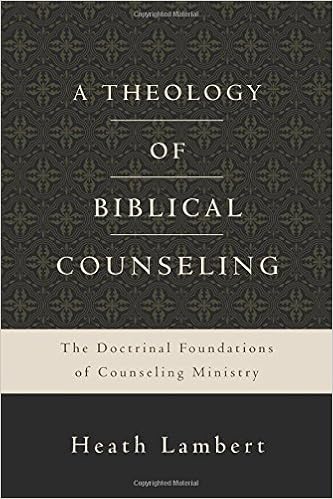
A Theology of Biblical
Counseling by Heath Lambert
Dispensing wisdom, giving good advice, listening to a friend
in need, these are all situations where we are all counseling, so says Heath
Lambert in his new book, A Theology of Biblical Counseling. Heath, no stranger to counseling, The
difference for Heath in his book is this, “Every vision of reality about
counseling with be theological. The only
question is whether a counselor adopts a theological vision of reality that God
believes is faithful – or unfaithful (17).”
This kind of counseling vision is what steers every part of this book,
and steers people toward Christ and His Word.
In the second chapter, Heath offers a distinction between
those who see the Scriptures as necessary for counseling but not enough. He writes, “They often thing that the Bible
is necessary for people who need
counseling, but even then do not believe the Bible is enough. They think the Bible is a book about how to
get saved and walk with Jesus but is not focused on offering insight to the
most serious counseling topics (38).” This kind of difference is what leads Heath to
really delve into the Scriptures, especially Psalm 55 with Trenyan, a young
woman dealing with anger, the failure of her parents, and deep wounds. He writes, “It was so encouraging for her to
know that there were words in the Bible that gave expression to her sorrow
(62).”
Beautifully, Heath sets to expression what I have thinking
about for years, namely the powerful work of the Holy Spirit in the lives of
people. He writes, “For counseling to be
successful, the Holy Spirit must take the words of our biblical counsel and
press them into the hearts of people, convicting them in a way only people can
(163).” Conviction and judgment will
reap good harvests as the Spirit does the work of changing the heart of the
people we counsel. Further, Heath makes
a good distinction later in the chapter that is worth mentioning concerning the
filling of the Spirit. He writes, “I
believe Paul is not asking us to seek more and more of the Spirit, but rather
is asking us to depend on the Spirit more and more like Christ (171).” The goal is in concert with a Trinitarian
view of God, as we depend more on the Spirit our we are made more into the
likeness of Christ, thereby obeying God the Father and his will. Lastly, Heath gives the reader a very good
admonition when counseling fails, such that we pray to God the Holy Spirit for
direction, wisdom, and a powerful working in the lives of those we meet in the
counseling chair each day.
Thanks to Cross Focused Reviews and Zondervan for the copy
of this book in exchange for an honest review.
Comments
Post a Comment